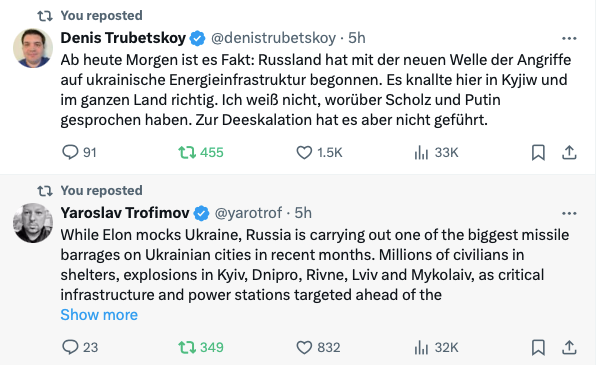1000 days
A grim statistic. A sleepless night in Ukraine. Shock in America. It's been a long week.
1000 days. It feels like 1000 years, and I'm not even in Ukraine.
Before you read further, I recommend taking a moment and viewing these 35 photos put together by AP on this grim day.
I woke up this morning to the news that last night had been a horrible one in Ukraine, with attacks across the country, on both cities and electricity infrastructure. It is now mid-November, and seasonably cold. I immediately thought about the lack of preparations here in Europe, and my heart sank. If already exhausted civilians have to leave their homes because they are cold this winter, and have to move west, will the west be ready? Here in Austria, we don’t even have a new government yet. I have heard nothing about any kind of plans to accommodate more refugees, if need be. It is the ticking time bomb everyone is willingly ignoring.
I spoke this week with several Ukrainians. The first was a woman in her late 50s from Mykolaiv told me how her husband is counting the days until he turns 60 and can leave. He is 59 and at the moment is “allowed” to go to work as a security guard without fear of being pulled off the street and thrown into the army. Her sons are not as lucky. One was abroad when the war started, and therefore never came back. The second is in Mykolaiv, but cannot live at home, where he is registered, as recruitment officers have already come looking for him several times at his home address. He is essentially in hiding. She doesn’t have to tell me that this isn’t a life for a thirty year-old man. I listen and feel so sorry for the whole situation, but then thought about those Ukrainians whose sons have paid with their lives, and wondered what they would say to her. There are no winners in all of this amongst ordinary people. The winners are somewhere safe, where the missiles do not land.
The second was from Odesa, here with her child. Her husband is back home, trying to work online, only going out at night for short walks. He is worried about being drafted. “It is not a life,” she says to me, and I nod in understanding. She talks about how many people have in this time become alcoholics, how many marriages have fallen apart. She hints that many Russian speakers in Odesa (it was and is a Russian-speaking city) would probably accept life under Russia in exchange for peace. I was a bit surprised, as this certainly was not the attitude at the beginning of the war, but Odesa has been under attack for nearly three years, and I completely understand how as a mother you just want your child to have a normal childhood in peace, and at some point who is in charge of the government becomes irrelevant. I shared these comments on X, and was attacked for spreading “Ruzzian” propaganda. Which is, frankly ridiculous. I even prefaced by saying talking to one person is like reporting from a new country after only speaking with your taxi driver. However, many of the loudest pro-Ukraine voices have also not themselves been sitting under threat of air attacks for nearly three years. Many of them are couch warriors. Whenever I am given the opportunity to ask real Ukrainians how they feel now in this moment, I ask. Same with Russians, naturally. I remembered, speaking with this woman, Putin’s obsession with the Black Sea. He said already in a public speech that he wants Odesa. We have no reason to believe that view has since changed.
I met a mother this week with a son with Asperger’s syndrome from Zaporizhzhia. She is here alone, and trying her very best to provide her son with the care here needs, helping him each step of the way with schooling and medical care. It is not easy. Her husband stayed behind because of both of their elderly parents. He could have left, as the father of a child with a disability, but they had no solution for how to care for the elderly if the younger generation was to leave. Now this mother sometimes goes home for visits with her son. I look at her and remind her that as one of the most dangerous places in Ukraine now, she did the right thing to leave and protect her son. She is now having to explain to the Austrian authorities why they sometimes go home and visit her husband/the boy’s father. It is all not easy. They have moved apartments four times. The boy is extremely sweet and as a kid on the autistic spectrum, doesn’t understand all of our social norms. He tries to hug me and wants to invite me over for coffee. I look at them both with so much admiration and sadness. Imagine stories like this a million times over.
And yet, how does it end? That I do not know. It certainly looks now at the moment as if Russia is using this moment to hit Ukraine hard. It seems to be making “progress” both in the air and on land. I would agree with those pundits who role their eyes at the Scholtz - Putin call this week. No idea what the German leader was trying to accomplish. He ends up looking like a fool.
Ukraine’s government and future negotiators are in a nearly impossible position. A rational person would tell them to cut their losses and head to the negotiating table, but how do you negotiate with a Russia that is not ready to negotiate, at least not yet? Russia’s economy is now solely focused on the war, and for now, surviving just fine. The poorest Russians are feeling better off economically than they have in years, even if that means having sacrificed the lives of male family members. The Bell released a good summary in English on the threat of stagflation in Russia. Mortgage rates have soared to crazy levels. Russia cannot produce enough butter at the moment (FT article on this behind paywall), due to manpower shortages. Reading this report on Russia’s war economy, it makes you think they have no plan B, and therefore little incentive to head to the negotiating table. Russia has so far been resupplying its army with contract soldiers tempted by large paychecks and North Koreans. If it turns to a draft (something Putin has clearly been avoiding to not shoot his own popularity in the foot), Russia could certainly keep fighting for much longer.
I cannot imagine what the thinking is within Ukraine’s leadership, as anyone who signs an unfavourable peace, resulting in lost territory after so many lives lost, both military and civilian, will be a villain forever, a black page in the history books. But I wonder what the price is of continuing, on inertia, with the odds of your victory falling as each day passes. A Trump presidency, with the incredible group of under qualified incompetents he has selected for his cabinet, surely means that the war in Ukraine will be an afterthought for those in DC. Trump promised his voters to fix America, and that will be his focus. That and China. Russia is clearly using this time, this time of political “no man’s land” in between administrations, to push forward. It hits Ukraine’s cities and energy infrastructure intentionally, to push the population to push their own government for “peace”. And if I were an ordinary mother with children in an ordinary Ukrainian city suffering sleepless nights for the third year in a row, I too might stop caring which emblem was on the cover of my passport.
I am simplifying things massively, but trying to illustrate a point that for many ordinary families, a return to ordinary life, of being able to go to work, kids being able to go to school, being able to make some kind of plans for the future, that is all they want. And at some point, for many, that may trump (no pun intended) patriotism.
In other news, a few days ago Russia stopped deliveries to Austria of natural gas for the first time in decades. For a full explanation, please see this article in German. As I understand it, Russia cut off gas deliveries after Austria’s oil and gas company which formally makes the contracts with Gazprom (and interestingly does not make them public to Austria’s taxpayers) refused to make payments in a certain way to Russia as Russia had requested. In short, Austria’s energy minister (herself on her way out once a new government is formed) assured the public that there is more than enough gas in storage plus alternative suppliers, but it is a substantial shock for a country which has spent the past several decades buying the majority of its gas from the Soviet Union and later Russia. It isn’t over yet, as this op-ed explains, but it does seem to be the first time Austria has really risked walking away from Russian gas, and if so, long-overdue from the point of view of Austria’s own energy security.
What I did not know is that Austria was, until Saturday, one of only three EU countries still receiving gas from Russia. Putin remains a master business strategist (ahem). Speaking of business, this interview reads like something out of another era, but for those of you who remember the “good old” days of doing business in Russia, this FT interview with a man I used to see in the elevator all the time at my first job in Moscow (we shared an office building) is worth your time. It was a shock to many when he was arrested after decades in Moscow as a successful businessman. It does surprise me how he, a clearly very smart person, didn’t see what was happening within Russia earlier. Perhaps a forest vs. the trees situation in which the money and lifestyle served as blindfolds, too.
From Championing Russia to a Moscow Jail (FT paywall)
Changing gears, I would also like to recommend a film, not having gone in with any pre-conceived notions, I found the Martha Stewart documentary on Netflix absolutely fascinating.
And if you have not yet listened to Bernie Sanders on The Daily this week, you must. I promise it is 100% worth your time.





